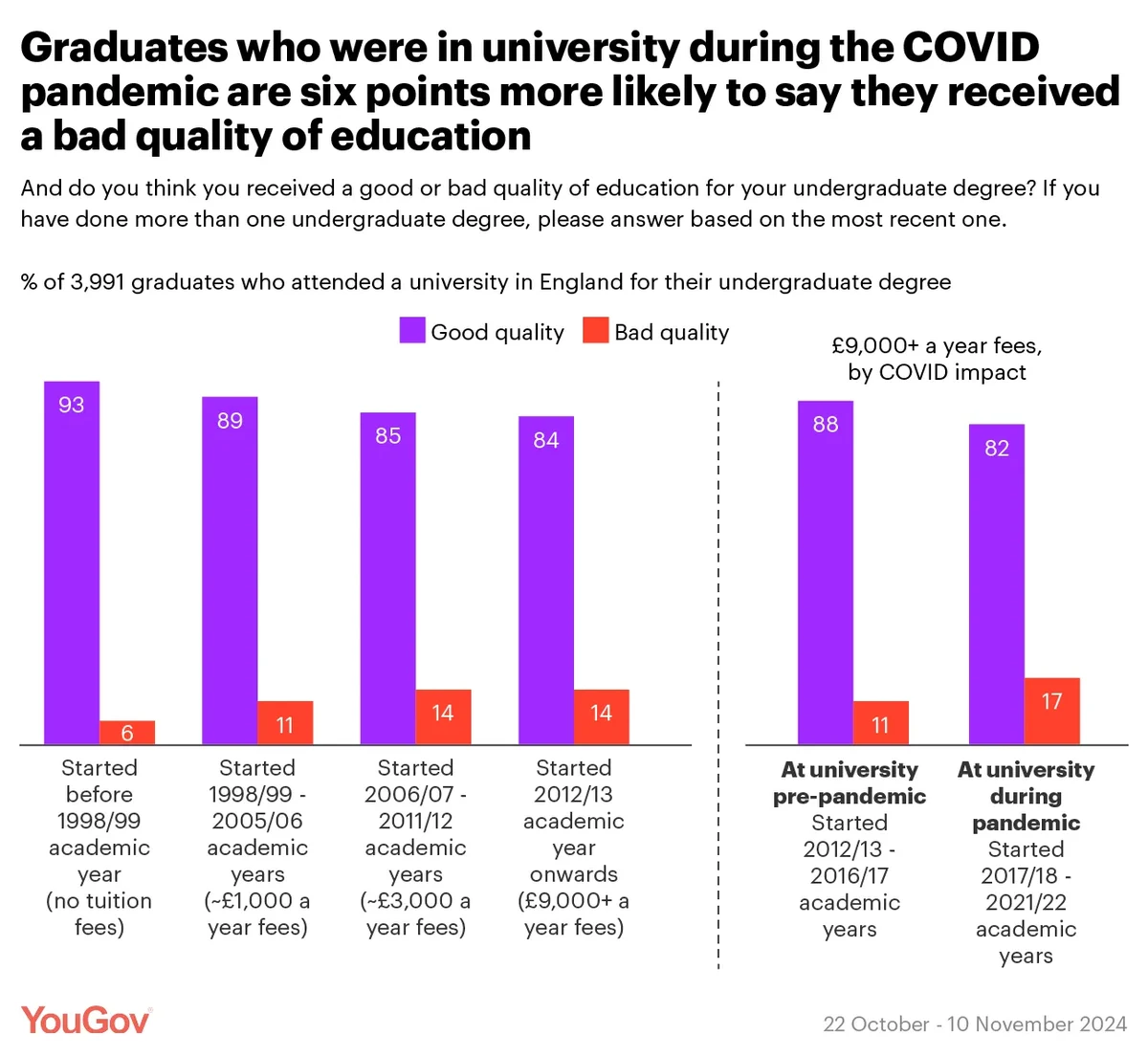Those who paid higher tuition fees are more likely to say their undergraduate degree was bad value for money, but higher tuition does not have a significant impact on the perceived quality of education
In November it was announced that undergraduate tuition fees in England would rise by £285 from September, bringing the cost up to £9,535 per year. In exchange for more funding, universities have been asked to improve value for money for students.
A new YouGov survey of almost 4,000 graduates from universities in England shows that those who paid £9,000 or more a year in tuition fees are significantly more likely to feel that the cost of their higher education represented bad value for money than graduates in previous years.
Fully 53% of graduates who started at an English university from the 2012-13 academic year onwards – i.e. the point at which £9,000 a year tuition fees were introduced – feel they received poor value for money, compared to 35% of those who attended under the £3,000 a year fees regime and 22% of those who went when fees were £1,000 a year.
This said, the amount of money graduates paid in tuition does not have a significant impact on the perceived quality of education. Only 14% those who attended university when fees were at least £9,000 per year or more in tuition fees say they received a bad quality of education, identical to the rate among those who went when costs were £3,000, and comparable to the 11% of those who attended during the £1,000 a year regime.
However, our research shows that perceived quality of education does appear to have been impacted by the COVID-19 pandemic. Those graduates who studied during the COVID-19 pandemic are more likely to say they had a bad quality of education (17%) than those who attended in the immediate years prior when tuition fees were still about the same level (11%).

Do graduates believe they are financially better off for having gone to university?
During the general election, the Conservatives pledged to close university courses in England with the worst outcomes for their students, including those where graduates have a lower earnings potential.
Across all graduates, only 39% think university is paying off financially, saying they earn more than they would have otherwise. A further 35% believe they are earning about the same as they would have done had they not attended university, while 12% think they are actually worse off as a result of their higher education.
Graduates are more optimistic when it comes to their future earnings, with 52% believing they will earn more over the course of their lifetime as a result of having attended university. Nevertheless, 31% still think going to university hasn’t affected their earnings potential, and 7% think it has reduced their eventual lifetime earnings.
Financial experience and expectations vary by subject studied, however. Those graduates who studied health and medicine (51%) or STEM (50%) courses are more likely to think they are earning more for having gone to university than humanities and social science graduates (35%) and those who studied the creative arts (21%).
These differences continue when asked about the expected differences to their income over their lifetime, with most STEM graduates (63%) and health and medicine graduates (58%) anticipating they will have made more over the course of their career as a result of having gone to university, compared to 50% of humanities and social science graduates and 34% of creative arts grads.
When it comes to the prospects of the most recent graduates (those who started university from 2017-18 onwards) are noticeably less likely to say they are currently earning more as a result of going to university (29%).
However, this is likely to be because this group are only at the very earliest years of their career. If we look at long-term expectations then the views of this group come to match or exceed those of their older peers, with 60% believing university will pay off over the course of their lifetime.
How helpful has university been for graduates’ careers?
Generally, graduates think their degree has been helpful for their careers so far (70%), and most think it will be for their future career prospects as well (57%). Among those in work, the majority likewise say their university education has been an aid in getting their current job specifically (61%), and being able to do that job well (56%).
Health and medicine graduates, and those who studied STEM subjects, are generally more likely to say their degree was helpful for their career so far (84% and 75%, respectively) than those who studied humanities and social science (68%) or creative arts (57%).
By contrast, there is much less difference when it comes to the implied amount paid for tuition, with 62-68% of graduates who started at university since expansion began in the 1998-99 academic year onwards saying their degree has been helpful for their career so far. This does, however, jump to 79% among those attended prior to this date, who will have paid no undergraduate tuition.
What do you think about university value for money, graduates' careers prospects, and everything else? Have your say, join the YouGov panel, and get paid to share your thoughts. Sign up here.
Photo: Getty








